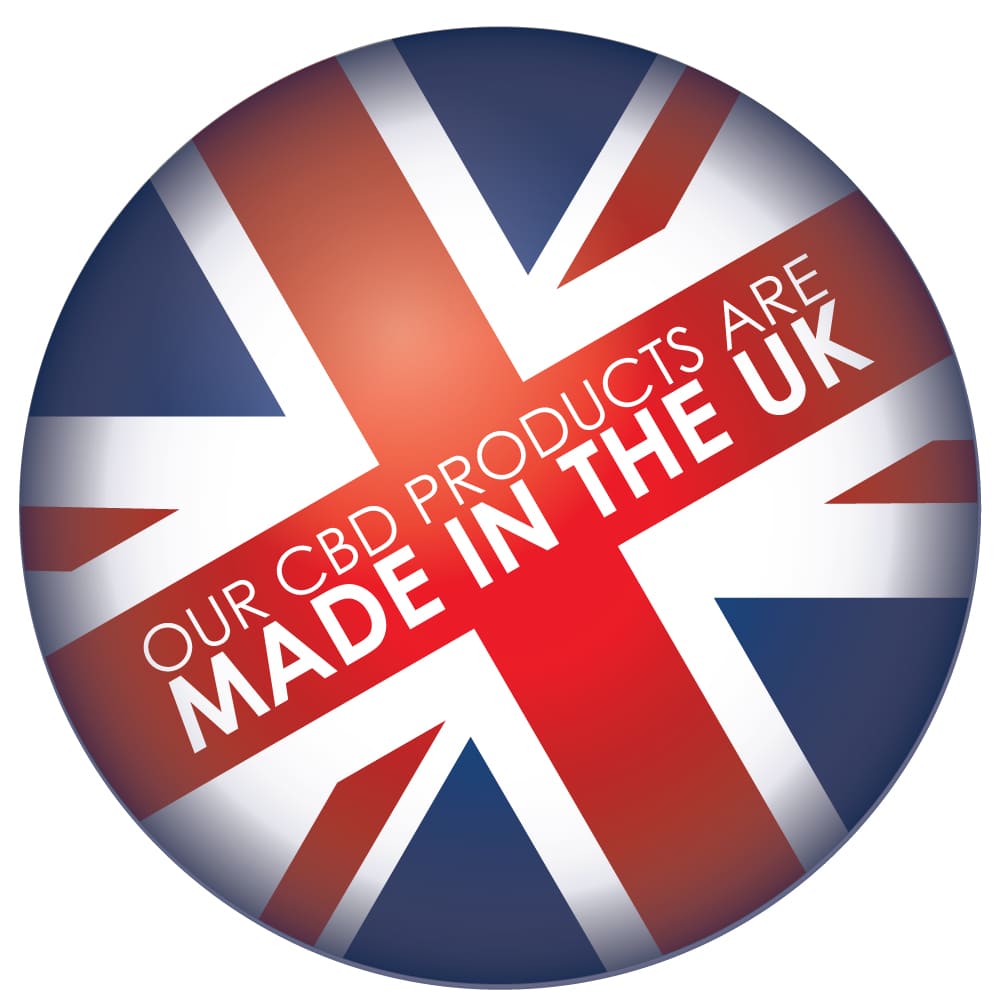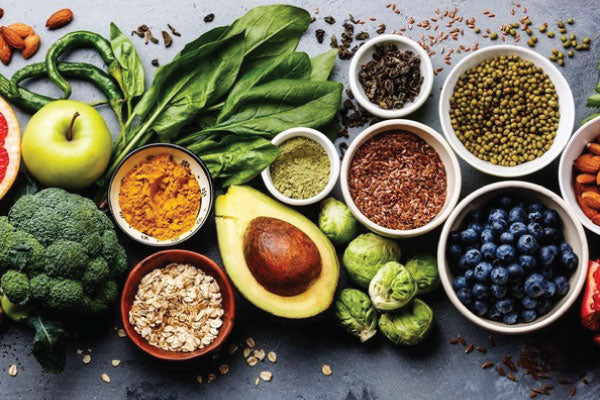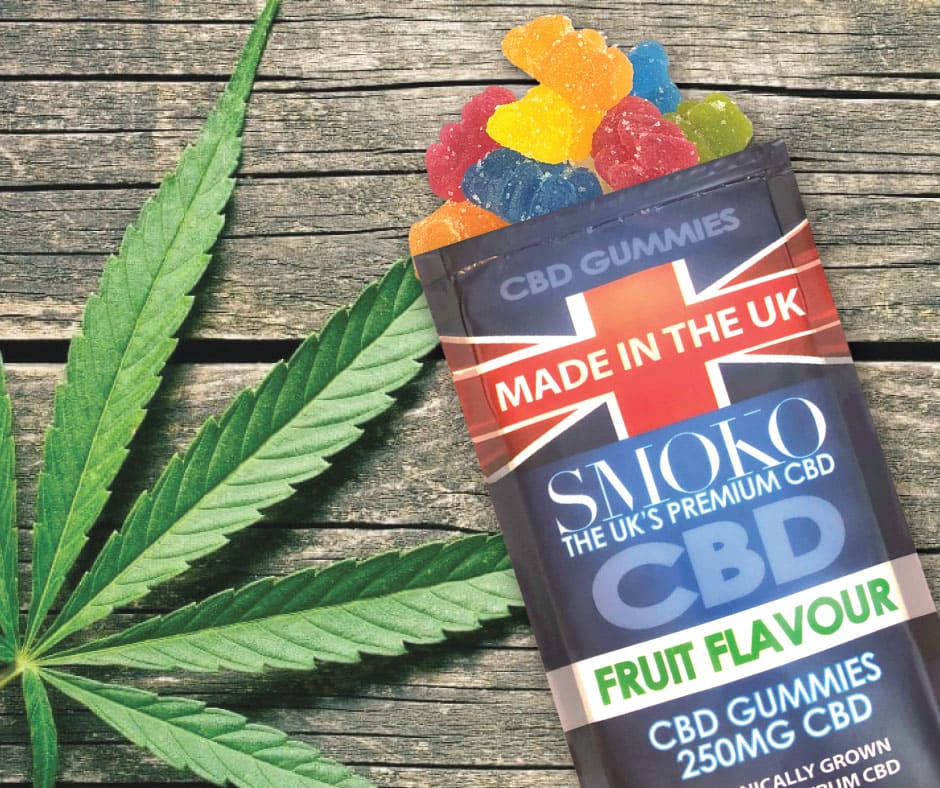Key Takeaways
-
Different oils, different benefits — Cannabinoid (CBD) oil is rich in active compounds that may support wellbeing, while hemp oil is nutrient-dense but does not contain CBD.
-
Know the labels — In the UK, “hemp oil” often refers to cold-pressed hemp seed oil, whereas “CBD oil” is extracted from the flowers and leaves of the hemp plant.
-
Choose based on your needs — Opt for CBD oil products if you’re seeking potential calming or anti-inflammatory effects, and hemp oil if you’re looking for a nutritious supplement packed with omega fatty acids.
Let’s get one thing straight right away: cannabinoid oil is a wellness supplement, while hemp oil is a nutritional food product. It's that simple. Cannabinoid oil, like the CBD oil we make, is carefully extracted from the hemp plant’s flowers and leaves to capture active compounds that work with your body's systems. Hemp oil, on the other hand, is just cold-pressed from the seeds and has no significant cannabinoids in it at all.
Defining the Core Differences
Getting your head around the difference between cannabinoid oil and hemp oil is the first step to avoiding a mistake here in the UK. Yes, they both come from the Cannabis sativa plant, but where they come from on the plant, what’s inside them, and what they’re used for are completely different. One is all about potential therapeutic benefits, and the other is basically a healthy cooking oil.
A lot of the confusion comes down to muddled marketing and inconsistent labels. To cut through that noise, you have to look past the shared plant origin and focus on what the oil actually contains and what it’s meant to do. This bit of clarity will make sure you pick the right product for your wellness goals or your kitchen cupboard.
Key Differences at a Glance
To make it even clearer, this table breaks down the essential differences side-by-side.
|
Feature |
Cannabinoid Oil (e.g. CBD Oil) |
Hemp Seed Oil |
|---|---|---|
|
Plant Source |
Extracted from the flowers, leaves, and stalks of the hemp plant. |
Extracted exclusively from the seeds of the hemp plant. |
|
Primary Compounds |
Rich in cannabinoids (like CBD) and terpenes. |
Rich in omega-3 & omega-6 fatty acids, vitamins, and minerals. |
|
Cannabinoid Content |
Contains a significant, measured amount of CBD; THC is negligible (<0.2% in the UK). |
Contains trace to no cannabinoids (CBD or THC). |
|
Primary Use |
Wellness and therapeutic purposes (e.g., managing stress, discomfort, sleep). |
Culinary and cosmetic purposes (e.g., salad dressings, skincare). |
|
Extraction Method |
Sophisticated methods like CO2 or ethanol extraction. |
Simple cold-pressing of the seeds. |
The most important point to remember is whether it has cannabinoids or not. Cannabinoid oil is made specifically to concentrate these active compounds to support your wellbeing. Think of it like this: cannabinoid oil is like an essential oil extracted from a plant’s flowers for its active properties, whereas hemp seed oil is like olive oil pressed from the fruit (or in this case, seeds) for its nutritional content.
At the end of the day, their uses are worlds apart. You wouldn't use a cooking oil to help you unwind, just as you wouldn’t drizzle a potent wellness supplement over your salad. For a deeper dive, you might find our guide on hemp oil vs CBD oil vs marijuana really helpful. Understanding this core difference is the key to choosing the right product for your needs.
Understanding Cannabinoid Oil and Its Purpose
To really get to the bottom of the cannabinoid oil vs hemp oil debate, we first need to look at what makes cannabinoid oil such a popular wellness product. Unlike its culinary cousin, cannabinoid oil is made specifically to capture the active compounds from the hemp plant—the ones that can work with our bodies' internal endocannabinoid system. The most well-known of these is cannabidiol (CBD), which is why CBD oil is the most common type of cannabinoid oil you'll find here in the UK.
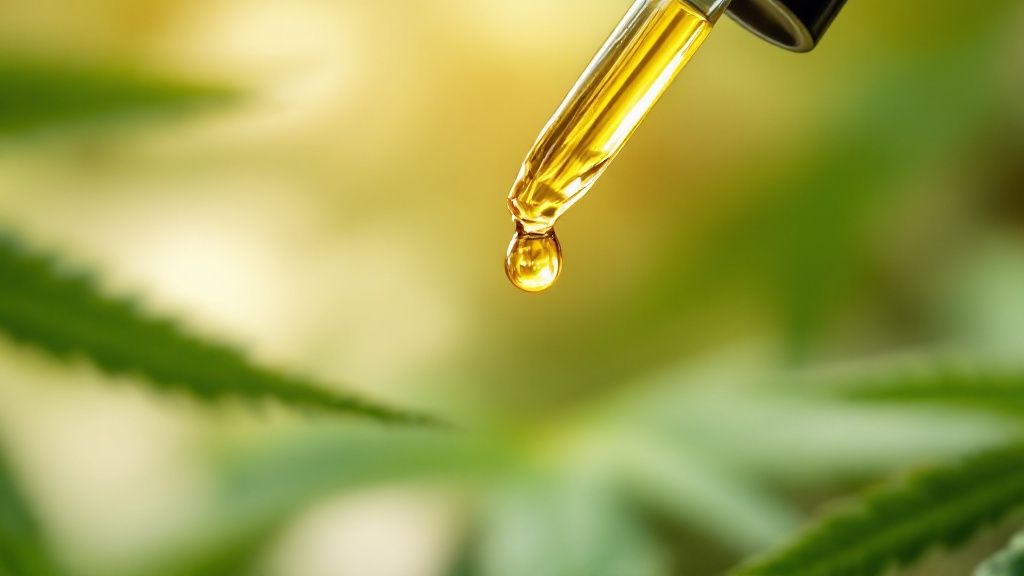
The whole point of producing cannabinoid oil is to create a concentrated extract that’s rich in these beneficial compounds. It’s a product designed for its potential therapeutic effects, not its nutritional value. Right from the start, this is the fundamental purpose that sets it miles apart from hemp seed oil.
How Is Cannabinoid Oil Made?
Creating a high-quality cannabinoid oil is a precise, scientific process. It all starts by sourcing specific parts of the hemp plant – namely the flowers, leaves, and stalks – because that's where the cannabinoids are most concentrated. The seeds, which are used for hemp oil, contain virtually none of these compounds.
To pull the cannabinoids and other valuable substances from the plant material, producers use sophisticated extraction methods. These techniques are designed to carefully preserve the delicate compounds, ensuring the final product is pure and potent.
The most common methods include:
-
CO2 Extraction: This method uses pressurised carbon dioxide to gently pull CBD and other cannabinoids from the plant. It's widely considered the gold standard for achieving purity and efficiency.
-
Ethanol Extraction: In this process, high-grade grain alcohol is used as a solvent to separate the cannabinoids. When done correctly, it's highly effective at creating a potent, full-plant extract.
Once extracted, the result is a thick, cannabinoid-rich oil. This extract also contains other useful plant compounds like terpenes, which create the plant's aroma and are thought to work with cannabinoids to enhance their effects. This synergy, known as the entourage effect, is a key reason why quality extraction is so crucial.
Its Role in Supporting Wellbeing
The primary job of cannabinoid oil is to act as a wellness supplement that works with the body's endocannabinoid system (ECS). The ECS is a complex cell-signalling network that helps regulate a huge range of functions, including mood, sleep, appetite, and pain sensation. Its main role is to maintain internal balance, also known as homeostasis, helping to keep things like inflammatory responses from being too aggressive or not aggressive enough.
CBD and other cannabinoids interact with this system, helping to support its regulatory job. It's for this reason that many people in the UK turn to CBD oil to help manage daily challenges and support their overall quality of life.
People often use cannabinoid oil to support balance in specific areas, like managing daily stress, promoting more restful sleep, or aiding recovery after physical activity. The goal is to gently encourage the body’s own systems to function more effectively.
UK Legal Landscape and Consumer Confidence
Navigating the world of cannabinoids can seem complicated, but the UK has clear guidelines to ensure consumer safety. For a cannabinoid oil to be legally sold in the UK, it must follow strict regulations. Most importantly, it must contain only negligible levels of THC (tetrahydrocannabinol), the psychoactive compound found in cannabis. The legal limit is extremely low, even for 'full-spectrum' CBD products, however products like SMOKO CBD oil are completely non-psychoactive because they contain 'broad-spectrum CBD' that aims to eliminate THC altogether, while keeping the beneficial cannabinoids, terpenes and flavonoids from the hemp plant.
This means you will not get a "high" from using legal CBD oil. Reputable brands provide third-party lab reports to verify the exact cannabinoid content and confirm the absence of THC, giving you complete confidence in what you are buying. For anyone new to this, our guide offers a detailed look into what CBD is and how to use it safely and effectively.
Decoding Hemp Seed Oil: A Culinary Staple
We've covered what cannabinoid oils are all about. Now, let's clear the air about its often-confused cousin, hemp seed oil. This stuff is in a totally different league from wellness supplements like CBD. Instead, you'll find it right at home in the kitchen pantry or on the bathroom shelf, valued purely for its nutritional and cosmetic chops.
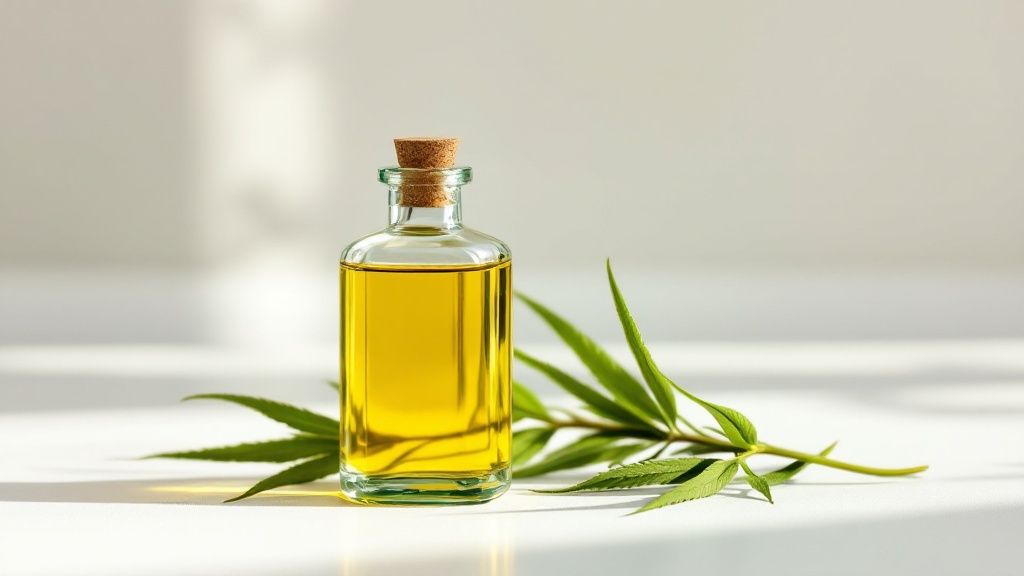
The biggest giveaway is where it comes from. Hemp seed oil is made by simply cold-pressing the seeds of the Cannabis sativa plant. Think of how olive oil or sunflower oil is made – it's a straightforward, mechanical process designed to keep all the delicate nutrients locked inside the seeds.
Crucially, hemp seeds contain virtually zero cannabinoids. That means no CBD, no THC, and absolutely no interaction with your body's endocannabinoid system. Any benefits you get are purely nutritional, which firmly places it in the health food camp, not the therapeutic one.
A Look at Its Nutritional Powerhouse Profile
The real reason hemp seed oil has become so popular is down to its fantastic nutritional makeup. Many consider it one of the most balanced oils you can buy, packed with essential fatty acids, vitamins, and minerals that are brilliant for a healthy diet.
Its main claim to fame is its perfect ratio of omega-6 to omega-3 fatty acids, which is typically around 3:1. This balance is widely seen as the sweet spot for human health, helping to support heart function and calm inflammation when it's part of your regular diet.
But that's not all. Hemp seed oil also contains a few other gems:
-
Gamma-Linolenic Acid (GLA): An omega-6 fatty acid that can help with hormonal balance and keeping your skin healthy. (1)
-
Antioxidants: It’s a good source of Vitamin E, which helps shield your body's cells from damage. (2)
-
Essential Minerals: You'll find a decent amount of magnesium, potassium, and iron, all contributing to your body's daily functions. (3)
It’s this nutrient-rich profile that makes it a great addition to your meals, not any cannabinoids.
Crucial Takeaway: When you buy hemp seed oil, you're buying it for its nutritional value—especially its healthy fats. It won't give you any cannabinoid-related effects because the seeds simply don't produce them.
Practical Uses in Daily Life
Once you understand what's inside, it's easy to see how hemp seed oil fits into your day-to-day routine. Its uses are all about nutrition and skincare. It has a pleasant, nutty flavour that works beautifully in a lot of dishes, though it's not one for frying – its low smoke point means it can't handle high heat. (4)
In the Kitchen:
-
Salad Dressings: Whisk it into a vinaigrette for a serious nutrient kick.
-
Smoothies: A tablespoon in your morning smoothie is a great way to get your fatty acids in.
-
Drizzling Oil: Finish off pasta, roasted veg, or soups with a little drizzle for extra flavour and goodness.
For Skincare:
-
Moisturiser: Its fatty acids are brilliant for hydrating skin without blocking pores.
-
Hair Care: Use it as a hair mask to nourish your scalp and give your hair a bit of strength.
Ultimately, hemp seed oil is a versatile health food. The best way to think about it is alongside things like flaxseed oil or a good extra virgin olive oil. Keeping this clear distinction in mind is key to navigating the cannabinoid oil vs hemp oil debate and making sure you walk away with the right product for what you need.
Comparing Health Benefits and Chemical Profiles
The real heart of the matter—what truly separates cannabinoid oil from hemp oil—lies in their chemical makeup. This isn't just a small detail; it's the fundamental reason they offer completely different benefits. One is all about therapeutic support, working with your body's internal systems, while the other is purely about nutrition.
Understanding this distinction is key. Choosing the right oil comes down to what you're hoping to achieve, whether that's managing a wellness concern or just giving your diet or skin a healthy boost.
The Therapeutic Potential of Cannabinoid Oil
The value of cannabinoid oil comes from its rich concentration of cannabinoids, especially CBD (cannabidiol). These are the active compounds that interact directly with your body's endocannabinoid system (ECS), helping to keep things in balance. It's this interaction that unlocks all its potential wellness benefits.
Many people in the UK turn to cannabinoid oil for support with:
-
Managing Anxiety and Stress: CBD is well-known for promoting a sense of calm and relaxation, which can be a real help when dealing with the pressures of everyday life. (5)
-
Alleviating Discomfort: Thanks to its anti-inflammatory properties, it may help to soothe chronic pain, stiff joints, and sore muscles. It's a popular choice for those with arthritis or anyone leading an active lifestyle. (6)
-
Improving Sleep Quality: By helping to quieten the mind and relax the body, many users find that CBD helps them get more restful, uninterrupted sleep. (7)
The best cannabinoid oils contain more than just CBD. High-quality extracts will have a whole range of minor cannabinoids and terpenes that all work together. This is what's known as the "entourage effect," which many believe enhances the overall benefits. You can read our guide to learn more about unlocking nature's complete benefits with full-spectrum CBD.
The benefits of cannabinoid oil come directly from its active cannabinoids. You're using it for what it does inside your body, not for what's on the nutrition label.
The Nutritional Power of Hemp Seed Oil

Hemp seed oil, on the other hand, is all about nutrition. It has no significant amount of cannabinoids, so it won’t interact with your ECS at all. Its value comes from an impressive profile of healthy fats, vitamins, and minerals, which is why it's considered a "superfood" in the kitchen.
Here's where it really shines:
-
Heart Health: Hemp seed oil has an almost perfect 3:1 ratio of omega-6 to omega-3 essential fatty acids. This balance is widely considered ideal for supporting good cardiovascular health.
-
Skin and Hair Nourishment: Whether you eat it or apply it directly, these fatty acids, along with Gamma-Linolenic Acid (GLA), help to moisturise the skin, reduce inflammation, and strengthen hair.
-
Overall Nutrition: It’s a fantastic plant-based source of protein and contains antioxidants like Vitamin E, which help protect your cells from damage.
Just think of hemp seed oil as a healthier swap for olive or sunflower oil. It’s perfect for drizzling over a salad or blending into a smoothie to give your diet a nutritional kick. It is food, pure and simple.
Situational Use Cases: Which Should You Choose?
So, which one do you pick? The choice between cannabinoid oil and hemp oil really just comes down to what you need. It’s not about which one is "better," but which is the right tool for the job.
Cannabinoid oils are extracted for their CBD content, offering potential support for things like anxiety, pain, and sleep. Hemp oil, pressed from seeds, is used as a nutritional supplement or cosmetic ingredient and doesn’t have those active compounds. To be legal in the UK, CBD oil products must contain less than 0.2% THC.
The popularity of CBD products is soaring, especially for mental health support. One UK study found that many users found CBD helpful for anxiety (67%), depression (46%), and PTSD (41%). This really highlights the divide: hemp oil is a food product, while cannabinoid oil is all about meeting wellness demands.
How to Shop Smart in the UK Market
Knowing the difference between cannabinoid oil and hemp oil is one thing, but knowing what to look for when you're actually ready to buy can be a little tricky. The UK market is packed with options, and frankly, not all of them are up to scratch. To make sure you’re spending your money on a safe, high-quality oil, you need to become a savvy shopper.
This means looking past the flashy labels and bold marketing claims. The trick is to understand what quality looks like for each type of oil because the markers for a good cannabinoid oil are completely different from those for a premium hemp seed oil. Spotting these differences is your best defence against wasting money.
Verifying Quality in Cannabinoid Oil
When you're buying cannabinoid oil, your absolute top priority should be verifying its purity and potency. This is a wellness product designed to work with your body, so there's no room for guesswork. The single most important document you need to see is a Certificate of Analysis (CoA).
A CoA is just an independent, third-party lab report that confirms exactly what's inside the bottle. Any brand worth its salt will make these easy to find, usually with a QR code on the packaging or on their website.
Here’s what a good CoA will tell you:
-
Cannabinoid Profile: It shows the precise amount of CBD and any other cannabinoids, confirming the product's strength.
-
THC Content: This is vital for UK legality. The report must prove the THC level is below the legal limit, ensuring the product won’t get you high.
-
Purity Analysis: It screens for nasty contaminants like heavy metals, pesticides, and leftover solvents, giving you peace of mind that it's safe to use.
Crucial Tip: If a brand can't or won't provide a recent, comprehensive Certificate of Analysis from an independent lab, just walk away. Transparency isn't a bonus; it's a necessity for any product you're taking for your wellbeing.
On top of that, UK regulations are getting better at protecting consumers. CBD products now need Novel Food authorisation from the Food Standards Agency (FSA), a process that checks they meet high safety standards. For a full rundown of the rules, you can check out our complete guide to UK CBD law and regulations. This legal framework is a huge step forward, helping to build trust and filter out unreliable sellers.
Identifying Premium Hemp Seed Oil
Shopping for hemp seed oil is much more straightforward—think of it like buying a high-quality extra virgin olive oil for your kitchen. The main goal here is to preserve its nutritional goodness, so how it's made is key. You aren't looking for cannabinoids, but for a rich profile of fatty acids and vitamins.
Keep an eye out for these terms on the label:
-
Cold-Pressed: This method uses very little heat, which is vital for protecting the delicate omega-3 and omega-6 fatty acids that give hemp seed oil its health kicks.
-
Unrefined: This means the oil hasn't been bleached or deodorised, so it holds on to more of its natural nutrients, colour, and nutty flavour.
-
Organic: Choosing organic ensures the hemp was grown without synthetic pesticides or fertilisers, which means a cleaner oil for you.
Frequently Asked Questions
Even after breaking down the differences between cannabinoid and hemp oil, we find a few key questions pop up time and again. Let's tackle them head-on to clear up any confusion and make sure you're using each oil correctly.
Getting these practical details right is the key to getting the benefits you're looking for. We've put together answers to the most common queries we hear from our UK customers, so you can feel confident in your choice.
Can You Cook with Cannabinoid Oil?
Technically, yes, you can add it to food, but you really shouldn't cook with it. Think of cannabinoid oil (like our CBD oil) as a wellness supplement, not a kitchen ingredient. High heat is the enemy of cannabinoids and terpenes; it completely breaks down these delicate compounds, rendering the oil pretty much useless for its therapeutic benefits.
Hemp seed oil, on the other hand, is brilliant in the kitchen for low-heat uses. It has a lovely nutty flavour and a fantastic nutritional profile, making it perfect for:
-
Whisking into salad dressings
-
Drizzling over pasta or roasted veg after cooking
-
Blending into smoothies for a dose of healthy fats
Key Insight: Keep hemp seed oil in the kitchen for its flavour and nutrition. Take your cannabinoid oil sublingually (under the tongue) or stir it into cool food to preserve all the good stuff. Heating it is simply a waste.
Will CBD Oil Show Up on a UK Drug Test?
This is a perfectly valid concern and one we take very seriously. Here in the UK, for a CBD oil to be legal, it must contain less than 0.2% THC (tetrahydrocannabinol). That's the psychoactive compound that drug tests are looking for which is left in full-spectrum CBD products. At SMOKO CBD, our broad-spectrum products are lab-tested to ensure non-detectable levels of THC.
So, if you're using a high-quality, reputable broad-spectrum or CBD isolate product, you shouldn't have any issues. The risk only comes from unregulated, often full-spectrum, oils that might play fast and loose with the legal THC limits. Always, always check for a recent third-party Certificate of Analysis (CoA) to be sure the THC content is where it should be – which is nowhere!
Can You Safely Use Both Oils Together?
Absolutely. Not only is it safe, but it can be a great way to support your overall health. The two oils do completely different jobs in the body and don't interfere with each other in any negative way.
You could, for instance, add a spoonful of hemp seed oil to your breakfast for its omega fatty acids while taking your daily CBD oil to help manage stress or soothe aches. One is nourishing your body through your diet, and the other is supporting your endocannabinoid system to promote balance. They're a complementary pair, not rivals.
Ready to experience the targeted wellness benefits of a premium cannabinoid oil? Explore the lab-tested, UK-made CBD products at SMOKO CBD and find the perfect support for your health journey. Visit us at https://smokocbd.com to learn more.
References
(1) WebMD: Gamma-Linolenic Acid (Gla) - Uses, Side Effects, and More
(2) Healthline: Antioxidants Explained in Simple Terms
(3) NHS Overview: Vitamins and minerals
(4) ScienceDirect: Effect of cooking temperature and time on the quality and safety of hemp seed oil
(6) NIH: Antioxidative and Anti-Inflammatory Properties of Cannabidiol
(7) Use of Cannabidiol in the Management of Insomnia: A Systematic Review
Last updated 24/09/2025




